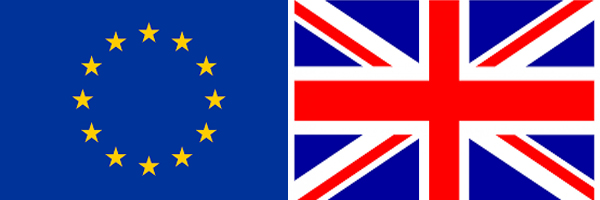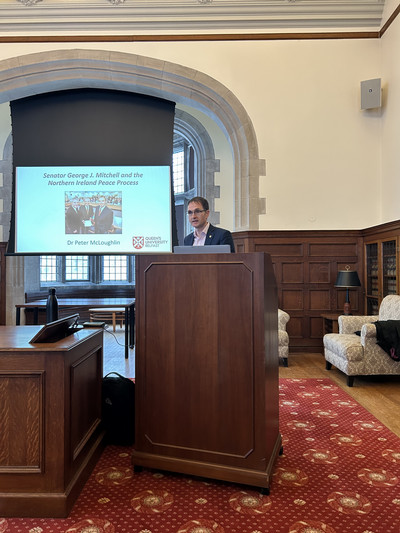Economics Professor Gonca Senel Discusses Brexit Vote
By Tom Porter
Britons head to the polls to vote in an historic referendum on whether to leave the European Union, and opinion polls suggest it could be a close call. Many prominent political voices, including Prime Minister David Cameron, have warned of serious economic consequences if the UK votes in favor of Brexit and detaches itself from the world’s largest trading bloc. Brexit supporters meanwhile argue Britain will be better off outside the EU, enjoying greater autonomy and freedom from European rules and regulations.
Assistant Professor of Economics Gonca Senel is teaching a course on European economics this coming fall. She spoke to College Writer and Multimedia Producer Tom Porter about the possible implications of the Brexit vote.
Tom Porter: Why do some in Briton want to leave the EU and what might be the potential impact of a Brexit on the UK economy?
Gonna Senel: The relationship between the UK and the EU has always been uneasy. The UK is against the supranationality of the EU and demands more sovereignty. On this aspect, Brexit reflects the discomfort among Britons who would like to enjoy more freedom. Before getting into the details of the economic consequences of Brexit, let me summarize the arguments of the Leave campaign:
- Fiscal Effects of Brexit—The UK, being a net contributor to the EU budget, will be able to redirect these resources in more productive areas within the country.
- Immigration Control after Brexit—Immigration has a negative effect on wages and unemployment. The UK doesn’t have any power to control it since free movement of labor is enforced by the EU law. By exiting the EU, the UK will be able to prevent immigration inflows by protective laws.
- Increase in productivity due to less regulation after Brexit—Existing product market regulations in the UK on health and safety issues as well as the labor market regulations are too restrictive and they prevent growth through limiting competition and innovation. Brexit will give the UK the room to prevent excessive regulations and create economic growth.
- Freedom of choosing trade partners after Brexit—The UK is bound by EU law and cannot make trade negotiations with non-EU countries individually. By exiting the EU, the UK would be able to make its own trade agreements with major economies like the US, and China.
At first sight, these arguments may sound reasonable. However, a majority of economists (including me) think that a deeper economic analysis of the issue shows that the UK economy will slow down and experience welfare losses after the exit. It is very likely that the losses due to reduced trade and foreign direct investment will exceed the gains from lower contributions to the EU budget.
A recent paper by Dhinga et al. (2016) finds that welfare losses for the UK after the Brexit would be between 1.28% and 2.61% depending on how pessimistic the model assumptions are. In addition, they claim that depending on the approach used, this negative effect may triple.
Since more than 50% of the UK exports go to the EU (around 15% of the UK GDP), the exit of the UK will have significant effects on the county’s trade costs due to the increases in the higher tariff barriers between the UK and the EU. In addition, even though the UK will have less regulations, which might have a positive effect on productivity, due to the high share of exports going to EU countries, changes in the regulations will increase the non-tariff barriers with the EU leaving the UK less competitive.
In addition, many multinational firms consider the UK as the gateway to the EU which makes the country an attractive venue for foreign direct investment. In the event of Brexit, the UK would lose this advantage and foreign direct investment will be hit severely since multinationals will have to pay tariffs and they will be less willing to invest in the UK which will reduce productivity and innovation.
Another argument of the Leave camp is about immigration and its potential negative effects on the labor market. Contrary to this argument, existing literature[1] shows that immigration has insignificant effects on wages and unemployment levels, and the welfare gains achieved by blocking immigration will be minimal.

Another issue that needs to be considered after Brexit is the negotiations between the UK and the EU, and the UK and the rest of the world. In terms of relations with the EU, Britons have multiple options to choose from: Norwegian model, Swiss model, Turkish model, relying on WTO, and special negotiations. Even though special negotiations are the most desirable one, it is very likely that the UK will face political obstacles from the countries within the EU and it will take a long time to finalize the negotiations. In addition, Brexit will necessitate that the UK has to replace all of the pacts with the rest of the world. During negotiations, it will have less bargaining power and it is less likely that terms of access with the rest of the world will be more favorable than before.
To sum up, it is very unlikely that the effects of the Brexit on the UK economy will be positive both in the short run and in the long run. In addition, this historic referendum can also create global uncertainty which might have dire consequences. We can already see the early effects of these concerns on the financial markets. Recent fluctuations in the British pound, and a plunge in the London’s FTSE 100 share index both indicate that the financial markets do not favor Brexit.
[1] Giovanni Peri (2012) ‘The Effect of Immigration on Productivity: Evidence from US States’, The Review of Economics and Statistics, 94(1), 348–358; Francesc Ortega and Giovanni Peri, ‘Openness and Income: The Roles of Trade and Migration”, Journal of International Economics, 92, 231-251
TP: What might be the impact of Brexit on the EU economy?
GS: It is easy to say that the impact of Brexit on the EU economy will be negative but hard to quantify how much it will affect overall economic environment.
In terms of trade, the EU is in a more advantageous position than the UK since the share of total imports from the UK is lower. However, during future negotiations with other trade partners, Brexit will reduce the bargaining power of the EU.
Beside economic effects, Brexit will have important political effects on the EU. First of all, the idea of a “fully integrated Europe” will fail and this may cause a domino effect among existing members also wishing to leave the EU. Higher uncertainty in the EU may lead to a more volatile euro market.
In terms of the decision-making process of the EU, without the UK, unanimity will be easier to achieve in some areas, like taxation and the social security system. However, given the positive influence of the UK on the competition policy, liberal markets and free trade, it is less likely that Brussels will be able to undertake the necessary reforms without the UK.
TP: How might Brexit affect the US economy and what are policymakers here saying?
GS: The UK government’s Inward Investment Report shows that US has the largest share of foreign direct investment in the UK. However, after Brexit, these US companies will not benefit from free trade agreements and their access to the EU market will be limited. This would force these multinationals to relocate to the other countries which will create additional economic losses. Currently, majority of the policymakers (except Donald Trump) as well as the analysts in Wall Street are aware of this situation and lobbying against Brexit.
TP: To what extent would a Brexit be an unknown quantity? There are no historical precedents for it, so how can we predict the outcome?
GS: It is very likely that the outcome will be negative for everyone. Even if no states have withdrawn from the EU before, existing economic models predict that increasing trade barriers reduce the welfare and this is exactly what we experience here.
In addition, it is very possible that EU will not allow the UK enjoy the benefits of being in a union as an ex-member while not paying any costs. Accordingly, the negotiation process will not be finalized for a long period of time which might increase uncertainty in the markets.
TP: Explain how this issue will be taught as part of your Economics course (Econ 2304) in the Fall semester?
GS: First we will analyze how the elimination of trade barriers will improve the welfare of countries within the context of theoretical models. Next, we will explore the structure of the EU and apply these models to quantify the welfare effects when the UK increases the trade barriers. In addition, if Brexit happens, we will be able to see its short run effects and evaluate the losses/gains of the EU and the UK with the help of data analysis. It will also be possible to explore the reactions of the financial markets to the negotiations between the UK and the EU. On the other hand, if Brexit doesn’t happen, pro-EU parties in the UK will gain power allowing closer relations between the UK and the EU. The UK will have an even higher bargaining power in the decision-making, which may lead to further reforms and a more integrated EU. To sum up, I can say that no matter what the historic referendum results are, it will be an interesting semester. I am looking forward to it.
References:
Dhingra, S., H Huang, G Ottaviano, J Pessoa, T Sampson and J Van Reenen (2016) ‘The Costs and Benefits of Leaving the EU’, Centre for Economic Performance Technical Report.
Dhingra, S., H Huang, G Ottaviano, J Pessoa, T Sampson and J Van Reenen (2016) ‘The consequences of Brexit for UK Trade and living standards’, Centre for Economic Performance Technical Report.
Dhingra, S., H Huang, G Ottaviano, J Pessoa, T Sampson and J Van Reenen (2016) ‘The impact of Brexit on foreign investment in the UK’, Centre for Economic Performance Technical Report.
Economists for Brexit: http://www.patrickminford.net/europe/book_index.html
Peri, G. (2012) ‘The Effect of Immigration on Productivity: Evidence from US States’, The Review of Economics and Statistics, 94(1), 348–358;
Ortega F. and Peri G. (2014 ) ‘Openness and Income: The Roles of Trade and Migration”, Journal of International Economics, 92, 231-251



